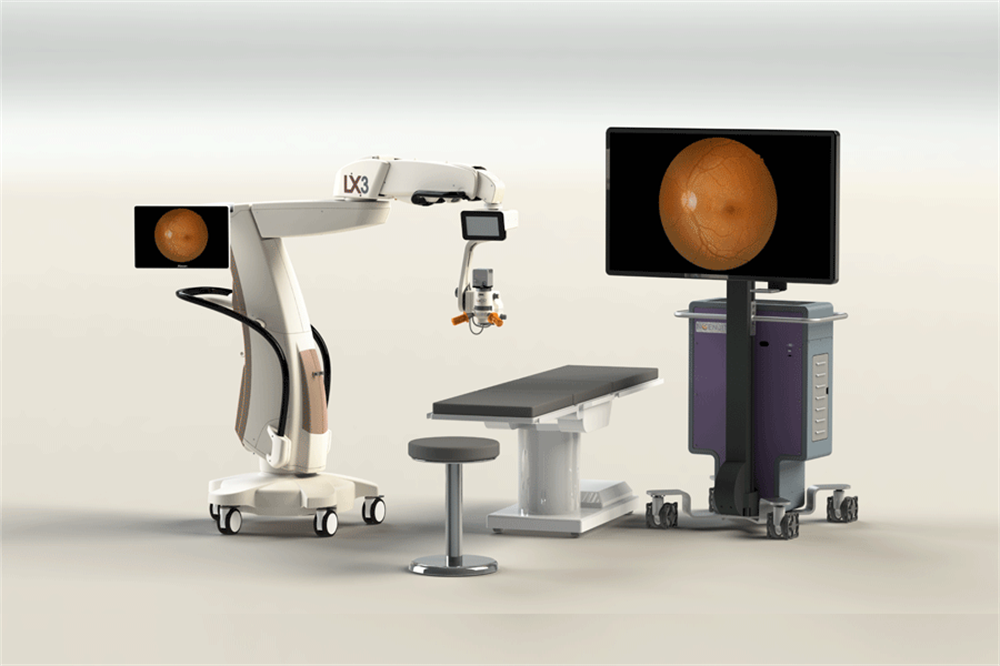- Services
- |
- Cataract surgery
Cataract surgery
In eye clinic “New Vision” we can operate even the most complex cataract cases WITHOUT ANY CUT, using the new advanced cataract removal technique with the English water jet "iQ-5 MINUTES"
Cataract removal
PRICE:
950 €
- Soft intraocular lens implantation
- Anesthesiologist supervision throughout the operation
- Revolutionary cataract removal method with water jet “iQ-5 MINUTES”
- The surgery is performed by highly qualified eye surgeons
Cataract Treatment at the “New Vision” Clinic
At the “New Vision” clinic, we specialize in cataract treatment, including the most complex cases, and guarantee a high level of medical care thanks to the many years of experience of our specialists. We offer:
- Traumatic cataract correction.
- Correction of the consequences of unsuccessful surgeries performed in other clinics.
- Assistance in the most complex and unique clinical situations.
All surgeries are performed by experienced surgeons, each of whom has completed at least 50,000 successful procedures. Their professionalism ensures the most effective and safe treatment.
Use of Advanced Technologies and Materials
For cataract treatment, we use only high-quality intraocular lenses (IOL) from the British company Rayner, which has been a leader in the development and production of IOLs since 1949. Their lenses are known for their reliability, durability, and excellent optical properties, ensuring outstanding surgical results.
- A comprehensive approach to treatment.
- Modern equipment and technologies.
- Individual lens selection based on patient needs.
- Post-operative care to achieve optimal results.

Why choose cataract surgery at the eye clinic “New Vision”?
After cataract surgeries in conventional hospitals or medical centers patients still use glasses to read or look into the distance. Truly full-fledged vision is possible only with the implantation of a multifocal lens, which is why the specialists of our eye clinic "New Vision" choose high-quality lenses from the English company RAYNER.
successful cataract surgeries
During the long years of work of the eye clinic "New Vision", we have provided hundreds of thousands of ophthalmic services to our patients.
By choosing one of the most modern and reliable clinics in the Baltic States – the eye clinic “New Vision” – you can be sure of the quality of services provided here. Our network of clinics has served more than 5.000.000 patients over the past 15 years.

The “gold” standard for cataract removal is a seamless operation lasting up to 5 minutes, suitable for even the most complex cases. It involves the implantation of the intraocular lens RAYNER, allowing the patient to regain excellent visual acuity.

Only our eye clinic “New Vision” uses this innovative eyesight treatment program “Live Vision”, based on technology recommended by pilots and astronauts. This program enables patients to make cataract, presbyopia and refractive surgeries and thus restore youthful close-up and distance vision without glasses.
Cataract surgery price list
| Service | Price EUR |
|---|---|
Cataract surgery (Refractive lens exchange - RLE)
| 950 |
| by implanting a soft intraocular vision correction lens Rayner or Alcon. | |
Cataract surgery (Refractive lens exchange - RLE)
| 1050 |
| by implanting a soft intraocular vision correction lens RayOne EMV. | |
Cataract surgery (Refractive lens exchange - RLE)
| 1060 |
| by implanting a TORIC soft intraocular vision correction lens. | |
Cataract surgery (Refractive lens exchange - RLE)
| 1730 |
| by implanting a soft intraocular vision correction lens Acrysof IQ PanOptix. | |
| Cataract surgery (Refractive lens exchange - RLE) | 1530 |
| by implanting a soft intraocular vision correction lens Rayner RayOne Trifocal. | |
| Cataract surgery (Refractive lens exchange - RLE) | 1844 |
| by implanting a soft intraocular vision correction lens PanOptix Toric. | |
| Cataract surgery | 800 |
| without vision-correcting lens implantation | |
| YAG laser treatment | 185 |
| capsulotomy (for secondary cataract) | |
| Anesthesia | Free of charge |
| included in the price of the service | |
| Service prices are for one eye surgery | |

Do you have compulsory health insurance?
Your vision treatment can be funded by the health insurance!
Knowing is beneficial: www.vlk.lt
Frequently asked questions about cataract treatment:
In the modern world, around 300 million people have vision problems. The diseases are diverse – from myopia to glaucoma. However, regardless of the severity, each of them diminishes the quality of life, as it limits the ability to see the world without obstruction. By undergoing regular vision checkups, we ensure this opportunity, as we can detect various problems in time that, if left untreated, could lead to serious diseases or blindness. Ophthalmic examinations are the key to maintaining eye health, as timely prevention or early-stage treatment helps avoid their progression and the continuous deterioration of vision.
Every day, we encounter various external and internal factors that can impact the quality of our vision. The causes of eye diseases can include injuries as well as genetic predisposition. In any case, it is important to seek consultation from an ophthalmologist in time to ensure a bright future for your eyes.
Treatment of Cataracts: The Opportunity to See the World in a New Way
Cataracts, surgery, price: many questions arise immediately. Let’s provide the answers. A cataract is a progressive eye disease characterized by clouding of the lens (the natural lens of the eye that provides clear vision by focusing light on the retina). The primary mechanisms that provoke cataracts are the denaturation of lens proteins, oxidative processes, and disruption of the water-electrolyte balance. The causes that can influence the development of cataracts include:
- Hereditary factors.
- Natural age-related changes in the body.
- Blows or other injuries that may damage the lens.
- Chronic diseases.
The “New Vision” clinic offers cataract removal using a modern method, iQ-5 minutes even in the most complicated cases. Our team of ophthalmologists has years of experience and thousands of surgeries behind them, ensuring the results you need. For our specialists, lens replacement is something they do with pleasure, as they are focused on effective results and helping patients improve their vision quality. Lens replacement – the price matches the result.
Cataract Surgery: Stages
If after consulting with an ophthalmologist, you are diagnosed with a condition requiring cataract surgery, we advise you to dismiss any worries. Surgical removal of the cloudy lens is the only effective treatment for cataracts. The doctors at “New Vision” clinic will restore your vision with the implantation of an artificial intraocular lens and ensure a comfortable experience through all stages of treatment.
Cataracts are often caused by age-related changes in the body, so there’s no need to fear it – you need to fight it. The surgery lasts no more than 20 minutes, so it doesn’t require hospitalization. The key is to undergo all the necessary tests and trust the hands of professionals. Since the procedure is brief, it consists of only a few stages:
- Local anesthesia (drops) administered by the ophthalmologist to numb the eye.
- Incision and removal of the cloudy lens.
- Implantation of the artificial intraocular lens.
After just a few hours, you can return home and begin your recovery process.
Cataract Removal: Price and Contraindications
A personal consultation with an ophthalmologist will help you learn all the details about the surgery, its price, and possible risks. Contraindications include: oncological diseases, pregnancy, and eye infections. However, only examination and the doctor’s recommendations can determine the right treatment path for you.
Effective cataract removal, the price of which directly depends on the chosen intraocular lens and the complexity of the case, will return you to a full life, allowing you to enjoy the full spectrum of the world’s colors and forget about the recent vision problems.